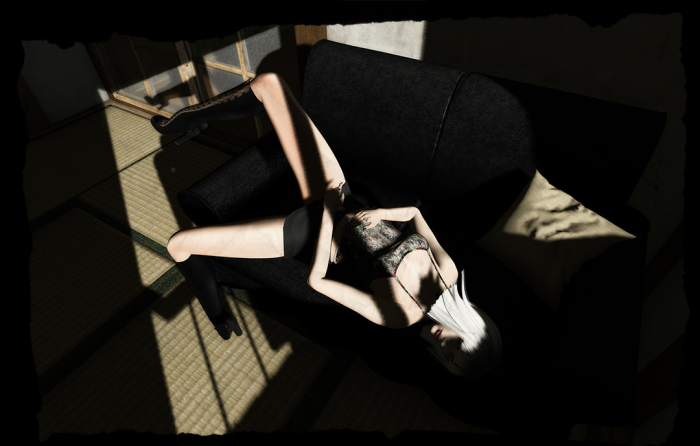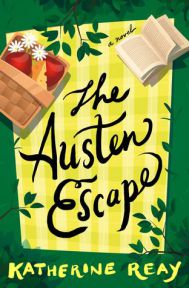I used to love zombie fiction. I really, really did, but now I find that the bandwagon riders have boarded the “Zombie Apocalypse Survival Guide” and “World War Z” train and ridden it into the dirt. Zombie fiction sucks now, and has lost much of what drew in its original appeal.
Two book series have changed my mind. John Ringo’s “Black Tide Rising” series, and D.J. Molles’ “The Remaining.” The two could hardly be more different from each other, but each series is immensely entertaining and well-written.

Starting with Molles’ series, I can only describe his writing style as if Tom Clancy and George R.R. Martin had a baby, and then that baby was mugged by Cormac McCarthy. The world created by Molles is, in a word, bleak. And violent. Gloriously, wonderfully violent.
The series is as follows;
The Remaining
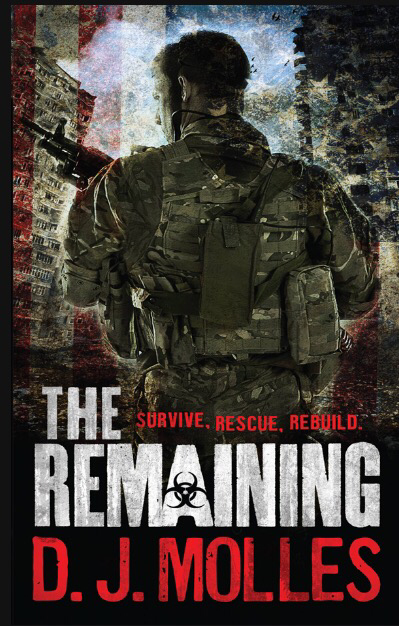
Aftermath
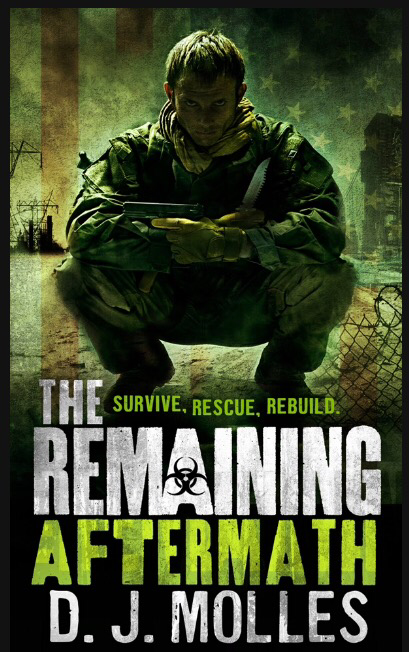
Refugees

Fractured

Trust (a novella)
Faith (a novella)
Allegiance
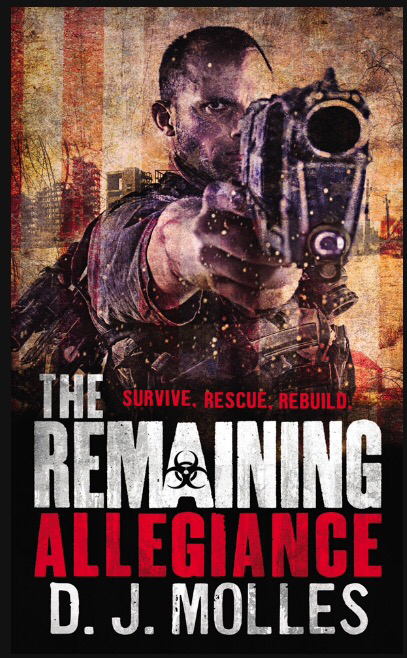
Extinction

The series centers around a man named Captain Lee Harden, a former Army Ranger who became a part of a secret government program called “Project Hometown.” The project set up one highly trained man in each state, with access to multiple bunkers full of goodies like rifles, explosives, food, water, medical equipment, and hundreds of thousands of rounds. In the event of a total collapse, each man was required to take cover in one of their bunkers for a specified time period, then come back out to help individual communities establish order. The short term goal was the survival of the human race, which required extensive combat, leadership, and medical training. The long term goal was the eventual rebuilding of the United States, which meant that each operator had training in sociology, government, economics, etc.
Captain Lee Harden has everything going for him; weapons, equipment, ammo, food, and an awesome dog. Essentially, he has what I want for my next Christmas (hint hint…), but multiple bunkers full of it. That’s the easy part. As the series progresses, the author seems to look at a particular situation and ask himself, “What would suck the most? I’ll make that happen.” Nothing goes right, and each plan that is hatched to further survival ends up with multiple wrenches thrown into the works.
The apocalypse itself happens in the form of a bacteria that eats away at the sentient portion of the brain, leaving only an animal, barely recognizable as a human. They’re more like the NotZombies of “28 Days Later,” which means they’re the scary fast ones as opposed to the slow, actually dead ones.

What freaked me out the most was that some of them could speak a few words. When a starved zombie clawed its way toward the main character with a knife in her hand, hissing the word, “Yoooou…yoooou…” over and over, I almost dropped a loaf in my pants right there.
This is a very military-centric series. Many of the good guys (and some of the bad guys) are former special operations and infantry guys, though the civilian population that managed to survive were pretty tough at that point as well. Surprisingly, there are exactly zero Navy SEALs. There are a lot of interesting tactics and strategies, and the author obviously spent a lot of time researching the gun-slinger business. He describes little details that only combat arms guys would know, like the way the wrist of your shooting hand hurts when you’ve held your rifle at the alert for an extended patrol. After reading the first book, I looked up D.J. Molles to see what unit he had served in. I was absolutely sure that he was a veteran based off of his in-depth knowledge of the infantry world, but to my surprise he had never been in the military. That impressed me even more, knowing that he had to have put in many hours of research for this series.
The themes of the series include a salvation/redemption theme, where multiple characters question their humanity after doing particularly terrible things. Another theme that takes precedence as the series continues is the necessity for terrible men to do terrible things for the good of a decent, civilized society.
The main character takes it upon himself to make tough decisions and kill whoever needs to die so that his group of people can live in peace. In his mind, the peace and civility of their society is a lie, propped up by the secret murder he is continually forced to commit for their benefit.
My favorite character was, strangely, the main one. Usually I don’t favor the main protagonist, but Lee Harden is the epitome of never giving up. No matter how bad it gets, Harden digs deep and finds a way to survive, fight, and win.
A second favorite was a former infantryman named LaRouche. Though he is a good guy, he lacks Harden’s iron will in staying afloat in the darkness. He loses himself more than once, and in contrast with Harden’s clinical, cold approach to killing, thoroughly enjoys it.
A young boy named Sam is a great character, and the reader watches him grow from a child into a man in the span of a few months. Like the previous two characters, he finds himself in situations where he just has to do what needs to be done to survive.
The zombies become characters in their own right as well. In a very interesting twist, Molles makes the zombies mutate into a few different subspecies. He goes in depth on the genetics, and makes it a very believable scenario.
I enjoyed this series because I was constantly surprised. I know how zombie fiction should go, and Molles defied those conventions at every turn. He includes the stuff that many other stories leave out, like the terrible smell of unwashed refugees, the high likelihood of injury and death for even the main characters, and even has one character lamenting the lack of online porn after the apocalypse. The main characters do dangerous things, and guess what? They get some boo-boos, and those injuries affect them for the rest of the series. Unlike the movies, there is no one who gets shot in the shoulder, then shrugs it off as a mere flesh wound (there’s like, seriously, a bunch of bones, muscles and tendons in there). By the end of the series, a lot of characters are limping around because of their injuries.
There are multiple quotes that I have highlighted from the series, but my favorite is from the final book. Harden finds himself confronted by a close friend about some of his more violent and secretive acts. His friend being a woman, she asks him to open up and talk about the heavy burden he carries, and share his feelings. Being a man, he doesn’t really want to talk about his feelings regarding what amounts to murder (because what man really does?).
“‘You think I don’t want to tell you?’ He felt his anger level rising. He was trying to keep himself level, but she kept pressing. ‘You think I like keeping shit to myself? I don’t. It wears on me. But what I have to say, no one wants to hear, I promise you that. And I made my peace with that a long time ago. Because it’s not my job to make my voice heard and be understood as a person. It’s not my job to be happy and cheerful and friendly and appreciate the fucking beauty of the world around me.’ He shook his head. ‘No. It’s my job to do all the ugly shit that needs to be done so that all the other people can go on about their lives with some semblance of normalcy. That’s what I do. That’s what I’m good at.'”
Why should you read this series? In my opinion, the character of Lee Harden is worth getting to know in a multi-book series. His toughness and ability to continue his mission despite any obstacle makes him a singularly impressive figure, and one we could use more of. The storyline is realistic (for a zombie series), the pain is palpable, the fighting vivid. There are real-world leadership problems, and no flaky romances. This is what “The Walking Dead” should have been.

I’ve written about John Ringo before. He has quickly become one of my all-time favorite authors for his sci-fi, fantasy, spec ops, and general military thrillers. When I found out that he wrote a zombie apocalypse series, I *immediately* bought them all. They are as follows;
Under a Graveyard Sky
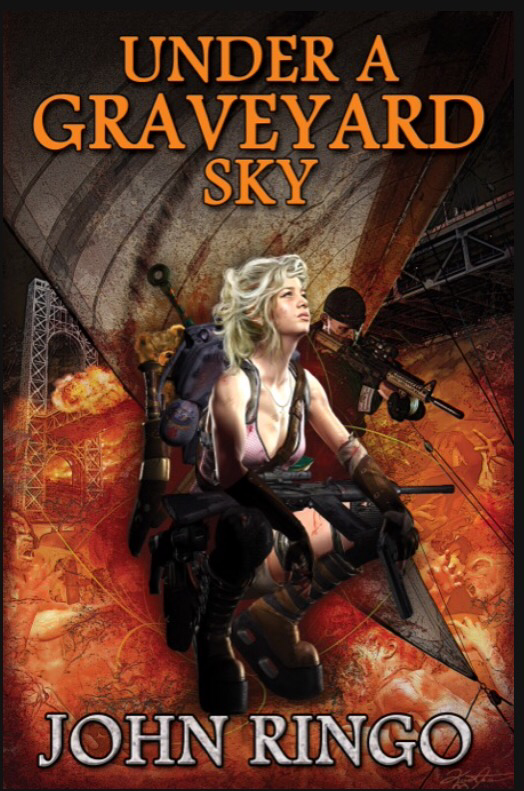
To Sail a Darkling Sea

Islands of Rage and Hope
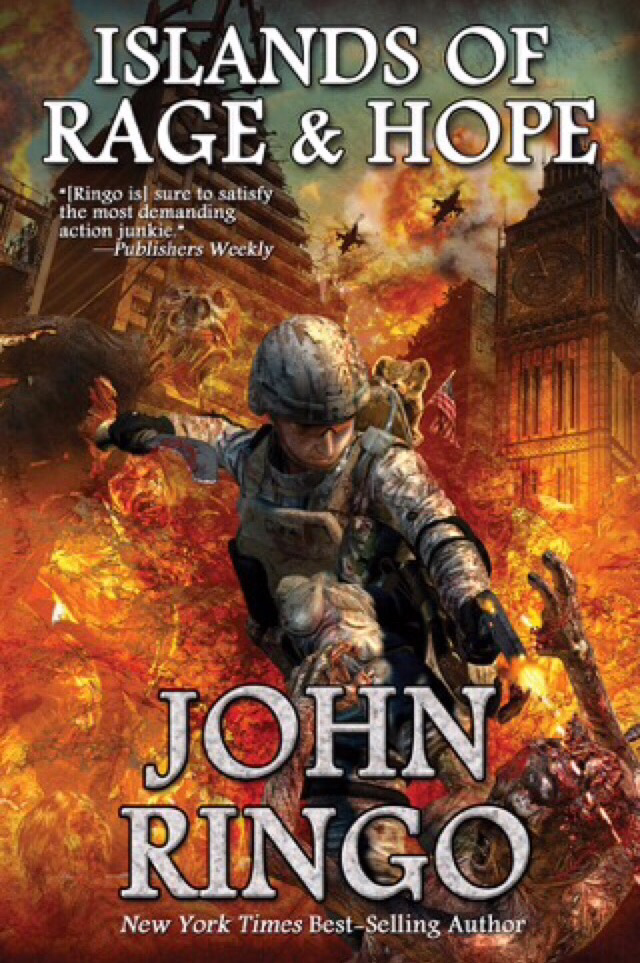
Strands of Sorrow

John Ringo’s “Black Tide Rising” series could easily be in the same universe as D.J. Molles’ series, but on the ocean rather than the forests of the east coast. The culprit, in this case, is a virus rather than a bacteria, and it is brilliantly explained with a depth not even matched in Max Brooks’ book. Ringo’s style is just as violent as Molles’ (are you noticing a trend in my reading material?), but rather than the dark, deep struggle, Ringo seems to sit at his computer and ask himself, “What would be a totally kickass thing to do in a zombie book? Drive a tank? Yes! LET’S DRIVE A TANK!!!” His writing style is like the lovechild of General Mattis and Anne Coulter, who just so happens to have been trained in stand-up comedy and economics.
What’s that? You’ve never heard of General Mattis? Punch yourself in the bippy, right now.

The experience of these books is similar to watching four movies like “Zombieland,” but with better tactics and weaponry. Comedy mixed with violence is my idea of a good time, and if it’s not yours, I don’t have any idea why you’re reading my blog anyway.
I have no idea how many times I have read this series (at least five), but each time is a treat. There are so many amazing scenes shotgunned throughout the books, and I sincerely look forward to re-reading them over and over again.
The series starts with the innocuously named Smith family; Steve and Stacy, with their two teenage daughters Sophia and Faith. They are a family of preppers, but unlike Captain Lee Harden of the previous series, their bug-out plan leads them into the ocean. After some excitement in New York City (which was awesome), they bump along in the ocean, listening to the radio as the entire world burns, until they find a survivor on another random boat. That survivor quickly becomes five, then ten, and so on as the family continues to search drifting boats for more living people.
Through a series of hilarious events, they rescue what appears to be all that remains of the United States Freaking Marine Corps. It’s a platoon-sized element who have been trapped in the bowels of a ship, and are very pissed off at being completely out of Copenhagen. From then on, things get…shall we say “aggressive?”
Again, whereas D.J. Molles’ storylines are rather dark, Ringo seems to try to find the coolest and funniest events he can imagine.
By far, the star of the series is young Faith Smith. As a thirteen year old girl, she is written as the reincarnation of Smedley Butler or Chesty Puller. Events lead to her becoming an infantry platoon commander of the only surviving active platoon in the Marine Corps. My combat arms brethren will snort in derision at that statement, as did I. My beliefs on women in the infantry have already been documented, but this story was actually pretty fricking awesome. Faith is the entire reason for reading this series in my opinion, and I can tell that John Ringo had a blast while writing this Valkyrie of a character. Her method of killing zombies has all of the enthusiasm of a teenage movie junkie, the skill of a seasoned DEVGRU operator, and the slapstick of “The Three Stooges.” Her constant monologues while shooting zombies in the face are always hilarious, and did I mention that she carries a teddy bear with her into battle? Oh yes. Oh yes indeed.
In the usual Ringo style of writing, there are a lot of leadership lessons thrown around throughout the series. Faith and her sister Sophia, being 13 and 15 years old, obviously struggle with leading fully-grown adults during an apocalypse. They receive a significant amount of guidance from their senior leadership, and the readers get to watch them grow a great deal. Again, my combat arms brothers will have to suspend reality for a bit, and just enjoy the image of a 13 year old girl ordering around a squad of infantry Marines.
One of my favorite parts about this series, and almost any other John Ringo series, is that he includes a playlist of music that he chose as a soundtrack to each novel.
The series is, in short, a spectacularly fun read. I either laugh out loud, or find myself smiling while delving into this series.
As far as favorite quotes, there were far too many to pick just one. Just picture Bill Burr as a teenage girl fighting zombies with a Haligan tool and a Saiga shotgun, and you’ve got yourself some dialogue from these books.
To summarize, these books actually did not restore my faith in zombie fiction. On the contrary, they ended it. I will likely never read zombie fiction again unless it is written by these two authors.
Advertisements Share this: